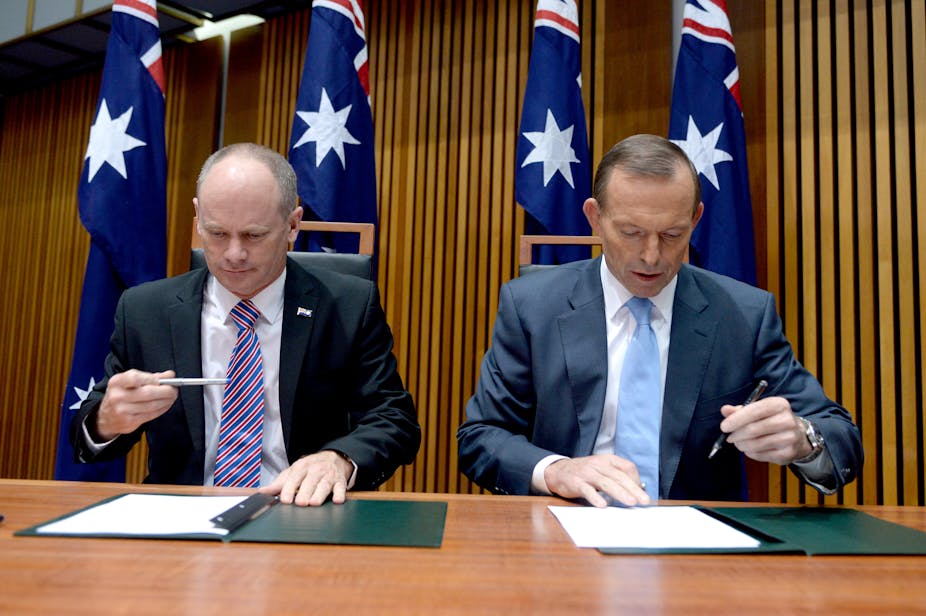The Commission of Audit has not flinched from making a tranche of bold recommendations to the Abbott government, but nothing in its report trumps the call for the Commonwealth to withdraw from areas that were once essentially state responsibilities, including education and health.
This would be nothing less than a major recalibration of Australia’s federal system, reversing decades of steady centralisation. The attractions of such a course are obvious, with the costs and inefficiencies of government duplication and overlap having long been well documented.
But we have seen the dawn of a “new federalism” fail to rise several times before. There are two reasons to be sceptical about the Commonwealth going along with the reforms necessary to realise the Commission of Audit’s vision.
First, there is the matter of money. Australia’s distorted federalism has come about through the Commonwealth gradually expanding its tax base to the diminution of that of the states. The states have become increasingly dependent on Commonwealth funding grants to meet their responsibilities.
The Commission of Audit reports that “around one-quarter of the Commonwealth budget” goes towards funding the states. This amounts to about 40% of state revenue and almost half of the money granted to the States is tied, meaning they come with conditions set by the federal government.
The Commission of Audit recognises that if real power in key policy areas – expensive ones at that – is to devolve back to the states then the Commonwealth needs to free up the states’ taxing potential. It recommends the states get a cut of the income tax levied in their respective economies.
Since the Commonwealth takeover of income tax in 1942, Malcolm Fraser has been the only prime minister who offered the states a chance to reclaim some of this ground – although they saw political dangers in the model proposed. When Bob Hawke appeared to get too close to fiscal reform of federalism, it gave Paul Keating the opportunity to topple him as party leader. History suggests the Commonwealth is very comfortable with its financial dominance.
This is largely due to the second factor that prompts scepticism: the contemporary political culture in Canberra. Federal parliamentarians have long ceased to show any regard for the constitutional division of power when they see a potential for gaining some electoral capital.
While Labor has traditionally been no friend of Australia’s federal system, an interventionist approach now pervades the political spectrum. John Howard ended his prime ministership pleading the case of “aspirational nationalism” in order to save a hospital from closure in Tasmania. In his book Battlelines, Tony Abbott essentially argued for constitutional amendment so that the Commonwealth might overrule State governments on any issue as the wish took it.
There is a greater likelihood of positive reaction to the Commission of Audit’s broad call for a culture of “competitive federalism” among the states themselves. This echoes the stance of the current crop of state premiers, such as Queensland’s Campbell Newman, who have been frustrated by the smothering effects of the Commonwealth agenda dressed up as “co-operation” at the Council of Australian Governments (COAG).
The institutional architecture to ensure that competition will lead to innovation and best practice across the states and to overall national benefit already exists in the form of the COAG Reform Council (the CRC). As a result of the 2008 Intergovernmental Agreement on Federal Financial Relations, the CRC monitors and reports on the performance of states in meeting mutually agreed national targets. The data produced illuminates which states are leading the pack in any “competition” between them.
The commission has, however, highlighted the swift derailing of the aspirations of the 2008 agreement. This was due to the Commonwealth being unable to refrain from policy intrusion into state affairs through the habitual making of new tied grants to the states. The commission’s recommendation that these be reduced in line with opening up income tax revenue to the states makes a great deal of sense.
But, as a consequence, the Commission of Audit calls for the abolition of the CRC, saying the reduced work that would be required after rationalising Commonwealth-state agreements could be performed by the Productivity Commission. It is a shame that the CRC is in the firing line because the Labor government that designed the federal compact of 2008 managed to sabotage its own achievement.
Although the CRC’s agenda is seen as the result of Kevin Rudd’s push for “co-operative federalism”, it is not responsible for the negative consequences of centralisation and administrative complexity. These stemmed from the way the Commonwealth went on to conduct federal relations.
There is a strong argument to retain the CRC with its direct experience in benchmarking state performance. Achieving the reinvigoration of federal-state power-sharing in Australia is an ambitious goal. A body dedicated to evaluating the results of federal reform would seem worth keeping.

